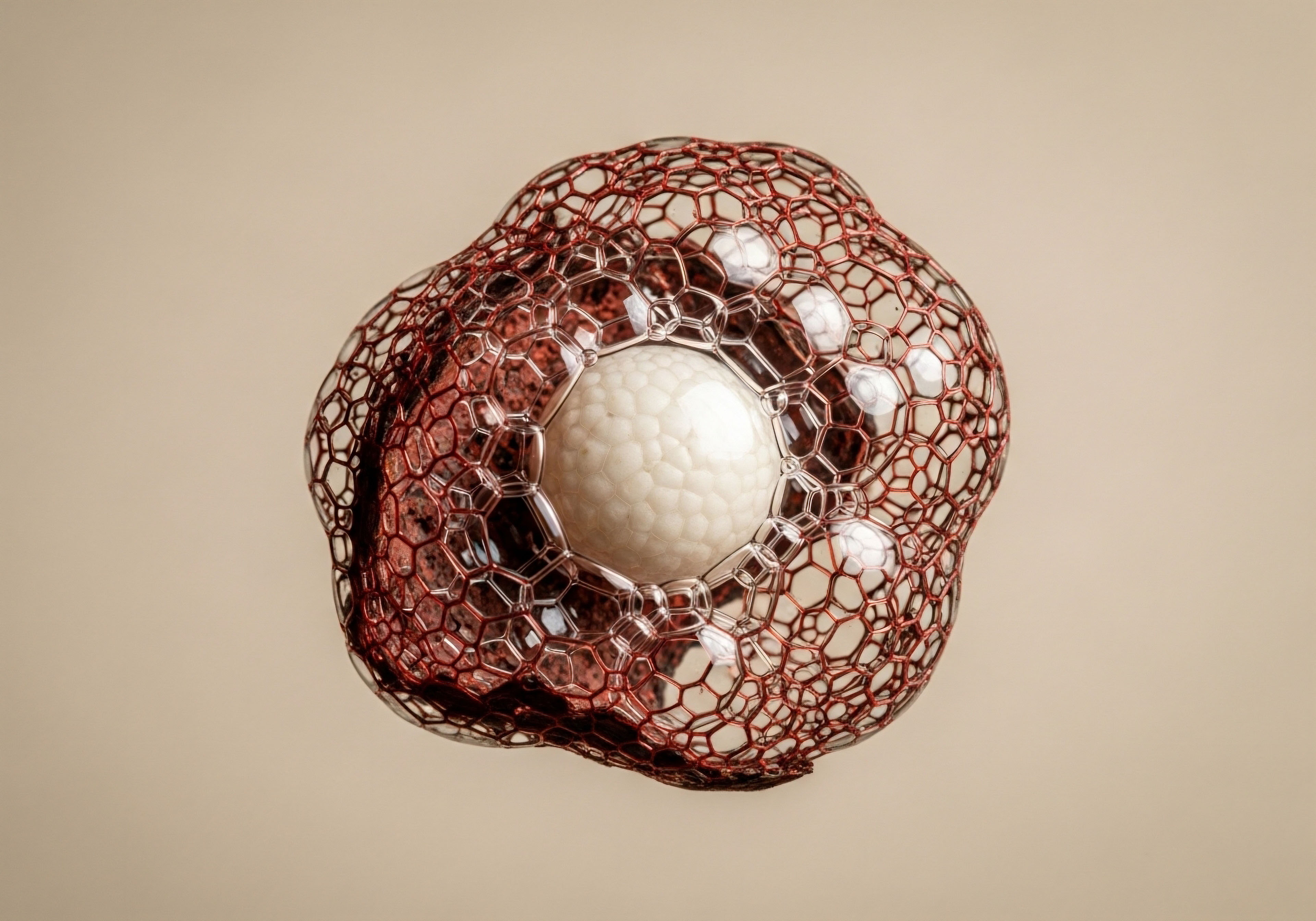

The Midnight Reclamation Cycle
The pursuit of peak human condition extends beyond the visible hours of training and deliberate nutrition. A profound transformation unfolds during the quiet of night, a period of intensive biological reclamation. This unseen power represents the foundation of sustained vitality and elevated performance. The body orchestrates a complex symphony of repair, renewal, and recalibration while consciousness rests.
Consider the daily toll of modern existence. Cellular structures incur damage, metabolic byproducts accumulate, and cognitive circuits experience overload. Without a dedicated phase for systematic restoration, the organism gradually degrades. The nightly cycle serves as a sophisticated internal engineering project, systematically addressing these demands. This process is integral to maintaining the intricate balance of the endocrine system, ensuring robust immune function, and solidifying the neural pathways responsible for learning and memory.
The drive for continuous advancement necessitates an appreciation for this nocturnal work. Athletes understand the role of recovery; high-performing executives recognize the value of mental clarity. Both outcomes stem directly from the quality and depth of this nightly rebuilding. The body’s capacity for adaptation, for growth, for becoming stronger and more resilient, is inextricably linked to the efficiency of these dark hours. We do not merely pause; we actively reconstruct.
Hormonal rhythms govern much of this restorative activity. Growth hormone, for instance, exhibits its most significant pulsatile release during specific deep sleep stages. This powerful anabolic signal directs tissue repair, fat metabolism, and muscle protein synthesis. Disruption to these precise timings impairs the body’s capacity to regenerate, leaving it vulnerable to systemic decline. The interplay of various endocrine signals during this period sets the stage for the following day’s metabolic efficiency and energetic output.
Beyond the physical, cognitive architecture undergoes a critical defragmentation. Memories consolidate, unnecessary neural connections prune, and emotional processing stabilizes. The brain clears metabolic waste products through the glymphatic system, a process significantly more active during sleep. This nightly cerebral cleansing is a prerequisite for sharp focus, creative problem-solving, and sustained mental endurance. Dismissing this biological imperative is a direct impedance to intellectual and physical dominance.
“Deep sleep stages correlate with up to a 70% increase in growth hormone pulsatility, directly influencing cellular repair and metabolic regulation.”
The integrity of genetic material also receives critical attention. DNA repair mechanisms activate during rest, correcting damage accumulated from environmental stressors and normal metabolic activity. This cellular vigilance preserves genomic stability, a fundamental determinant of long-term health and longevity. The organism safeguards its blueprint, ensuring future cellular generations retain their functional capacity.
Understanding this profound nightly work moves beyond passive acceptance of sleep. It transforms into a strategic period, a window of opportunity for directed biological optimization. This active approach acknowledges the body as a high-performance system, capable of precise self-correction and programmed advancement when provided the right conditions.


The Body’s Internal Engineering
The intricate mechanisms underlying nightly rebuilding involve a coordinated effort across multiple physiological systems. This internal engineering relies on precise hormonal signaling, cellular housekeeping, and neural reorganization. Each component plays a specific role in restoring the body to its optimal state, ready for the demands of a new day.
The endocrine system acts as the master conductor. Melatonin initiates the cascade, signaling darkness and preparing the body for rest. Cortisol levels, typically high in the morning to promote wakefulness, decline significantly at night, allowing the body to shift into a restorative mode.
The aforementioned growth hormone surges provide the raw signals for tissue anabolism and lipid mobilization. Thyroid hormones adjust, influencing metabolic rate to support repair processes without excessive energy expenditure. This delicate hormonal dance ensures resources direct towards rebuilding.

Cellular Autophagy and Protein Synthesis
Cellular autophagy, a process of controlled cellular self-digestion, becomes particularly active during the fasting state often associated with sleep. Damaged organelles and misfolded proteins are dismantled and recycled, clearing cellular debris and maintaining intracellular health. This cleansing mechanism rejuvenates cells, improving their functional capacity. Simultaneously, protein synthesis accelerates in tissues like muscle, driven by growth hormone and other anabolic factors. This dual action of breakdown and build-up represents a sophisticated approach to biological maintenance.
- Melatonin ∞ Initiates sleep, synchronizes circadian rhythm.
- Growth Hormone ∞ Stimulates tissue repair, muscle protein synthesis, fat metabolism.
- Cortisol ∞ Decreases at night, allowing for restorative processes.
- Glymphatic System ∞ Active during deep sleep, clears metabolic waste from the brain.
- Autophagy ∞ Recycles damaged cellular components.
The brain’s restorative processes are equally compelling. Slow-wave sleep, or deep sleep, serves as a critical period for memory consolidation. The hippocampus replays daily events, transferring information to the neocortex for long-term storage. This nocturnal data transfer refines cognitive maps and enhances learning retention. Furthermore, the brain’s unique waste removal system, the glymphatic system, becomes highly active during deep sleep, flushing out neurotoxic byproducts like amyloid-beta, linked to neurodegenerative conditions.
“During deep sleep, the glymphatic system expands by up to 60%, significantly increasing the clearance of metabolic waste products from the brain.”
This sophisticated network of processes defines true nightly rebuilding. It moves beyond a simple cessation of activity; it represents a dedicated, active phase of physiological reconstruction. The quality of these mechanisms dictates the degree of restoration achieved, influencing everything from physical recovery to mental acuity.


Mastering the Circadian Code
Optimizing nightly rebuilding demands a precise alignment with the body’s inherent timing mechanisms, its circadian code. This internal clock dictates the rhythm of hormonal release, cellular activity, and cognitive function. Ignoring these biological imperatives compromises the entire restorative process, diminishing the returns on every other health intervention.
Consistency in sleep and wake times represents a foundational element. Irregular schedules disrupt the suprachiasmatic nucleus, the brain’s master clock, leading to desynchronization of peripheral clocks throughout the body. This misalignment impairs the predictable release of hormones such as melatonin and growth hormone, which depend on specific light-dark cues and a regular sleep-wake cycle. The body thrives on predictable patterns, allowing it to anticipate and prepare for its various phases of activity and repair.

Environmental Control for Deeper Restoration
The sleep environment itself plays a significant role. Darkness, coolness, and quiet provide the ideal conditions for the brain to descend into deeper, more restorative sleep stages. Exposure to artificial light, especially blue light from screens, suppresses melatonin production, delaying sleep onset and reducing sleep quality. A cool room temperature (around 65°F or 18°C) supports thermoregulation during sleep, which is critical for deep sleep entry. Soundproofing and minimizing external disturbances allow the brain to remain in uninterrupted, reparative states.
Dietary timing also impacts nightly rebuilding. Consuming heavy meals close to bedtime can interfere with digestive processes, elevating core body temperature and diverting energy from restorative functions. A window of several hours between the last meal and sleep allows the digestive system to conclude its work, freeing up metabolic resources for cellular repair and detoxification. Nutrient intake earlier in the day supports the energy demands of the active wake period, leaving the night for repair.
Physical activity, strategically timed, enhances sleep quality. Regular exercise, particularly resistance training and high-intensity interval training, promotes deeper sleep and increases growth hormone secretion. However, intense physical exertion too close to bedtime can elevate core body temperature and stimulate the sympathetic nervous system, hindering sleep onset. Timing these activities earlier in the day or late afternoon provides the maximum benefit without disrupting the nightly restorative cycle.
Strategic supplementation, when appropriate, can support specific pathways. Magnesium, for example, contributes to muscle relaxation and nervous system regulation, facilitating sleep onset and depth. Certain amino acids, such as L-theanine, can promote a state of calm. These are adjuncts to foundational practices, not replacements for circadian discipline and environmental control. The aim remains a precise orchestration of conditions, enabling the body’s innate repair mechanisms to function optimally.

The Architects of Self
The profound power of nightly rebuilding stands as a testament to the body’s innate intelligence. It is a biological mandate, a daily opportunity to fortify our physical and cognitive architecture. We hold the blueprints for our future selves within the silent hours of darkness.
The decision to respect this period, to optimize its conditions, determines the trajectory of our vitality and our capacity for peak performance. This is a commitment to biological excellence, a declaration of intent to sculpt a resilient and potent future. The work happens, regardless of our awareness; our deliberate participation elevates it to an art.



